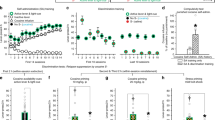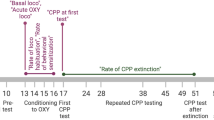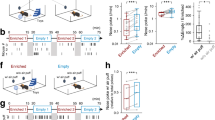Abstract
THE precipitated abstinence syndrome consists of a series of behavioural events which appear in morphine-dependent organisms after the administration of narcotic antagonists. Martin1 has suggested that some precipitated abstinence signs arise because an error force is generated when a narcotic antagonist resensitises a homeostat previously altered by a narcotic. Recently, in studies on the neuroanatomical correlates of morphine withdrawal, we found that brain areas associated with the wet shake behaviour of precipitated abstinence in the rat seemed to be closely adjacent to central pathways of heat dissipation and heat gain2–4. As morphine has complex effects on central thermoregulatory mechanisms5, the possibility was considered that the generation of an error signal in central thermoregulatory systems may account for the appearance of some precipitated abstinence signs. To test this hypothesis, we investigated the effects of environmental temperature on the precipitated abstinence syndrome.
This is a preview of subscription content, access via your institution
Access options
Subscribe to this journal
Receive 51 print issues and online access
$199.00 per year
only $3.90 per issue
Buy this article
- Purchase on Springer Link
- Instant access to full article PDF
Prices may be subject to local taxes which are calculated during checkout
Similar content being viewed by others
References
Martin, W. R., Pharmac. Rev., 19, 464 (1967).
Wei, E., Loh, H. H., and Way, E. L., J. Pharmac. exp. Ther., 185, 108 (1973).
Wei, E., Life Sci., 12, 385 (1973).
Wei, E., Loh, H. H., and Way, E. L., Life Sci., 12, 489 (1973).
Lotti, V. J., in The Pharmacology of Thermoregulation, (edit. by Schoenbaum, E. and Lomax, P., Karger, Basel, 1973).
Gibson, R. D., and Tingstad, J. E., J. pharm. Sci., 59, 426 (1970).
Wei, E., Loh, H. H., and Way, E. L., J. Pharmac. exp. Ther., 184, 398 (1973).
Wei, E., Psychopharmacologia, 28, 35 (1973).
Hainsworth, F. R., Am. J. Physiol., 212, 1288 (1967).
Martin, W. R., Wikler, A., Eades, C. G., and Pescor, F. T., Psychopharmacologia, 4, 247 (1963).
Herz, A., Teschemacher, H., Albus, K., and Ziegelgansberger, S., Psychopharmacologia, 26, 219 (1972).
Schwartz, A. S., and Eidelberg, E., Life Sci., 9, 613 (1970).
Halbach, H., and Eddy, N. B., Bull. Wld. Hlth. Org., 28, 139 (1963).
Hardy, J. D., Fed. Proc., 32, 1564 (1973).
Cremer, J. E., and Bligh, J., Brit. Med. Bull., 25, 299 (1969).
Lomax, P., Int. Rev. Neurobiol., 12, 1 (1970).
Collier, H. O. J., Francis, D. L., and Schneider, C., Nature, 237, 220 (1972).
Author information
Authors and Affiliations
Rights and permissions
About this article
Cite this article
WEI, E., TSENG, L., LOH, H. et al. Similarity of morphine abstinence signs to thermoregulatory behaviour. Nature 247, 398–400 (1974). https://doi.org/10.1038/247398b0
Received:
Revised:
Issue Date:
DOI: https://doi.org/10.1038/247398b0
This article is cited by
-
In vivo tracer studies of glucose metabolism, cerebral blood flow, and protein synthesis in naloxone precipitated morphine withdrawal
Neurochemical Research (1987)
-
Comparative effects of thyrotropin releasing hormone, MK-771 and DN-1417 on morphine abstinence syndrome
Psychopharmacology (1985)
-
Inhibition of shaking movements in rats by central administration of cholinergic and adrenergic agents
Psychopharmacology (1983)
-
Influence of lisuride on morphine withdrawal signs in the rat: A dopamine-mimetic effect
Psychopharmacology (1982)
-
Comparison of opiate agonists and their N-allyl derivatives in the production of physical dependence in the rat
Psychopharmacology (1979)
Comments
By submitting a comment you agree to abide by our Terms and Community Guidelines. If you find something abusive or that does not comply with our terms or guidelines please flag it as inappropriate.



